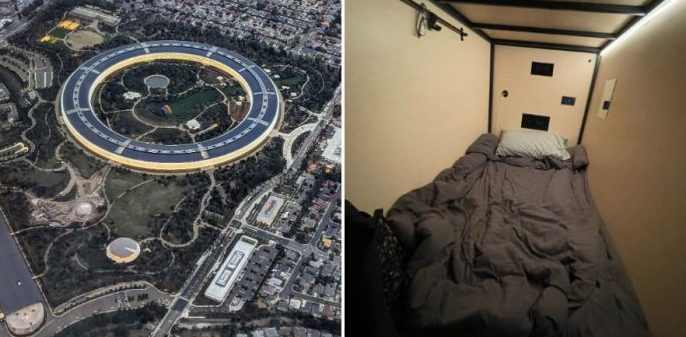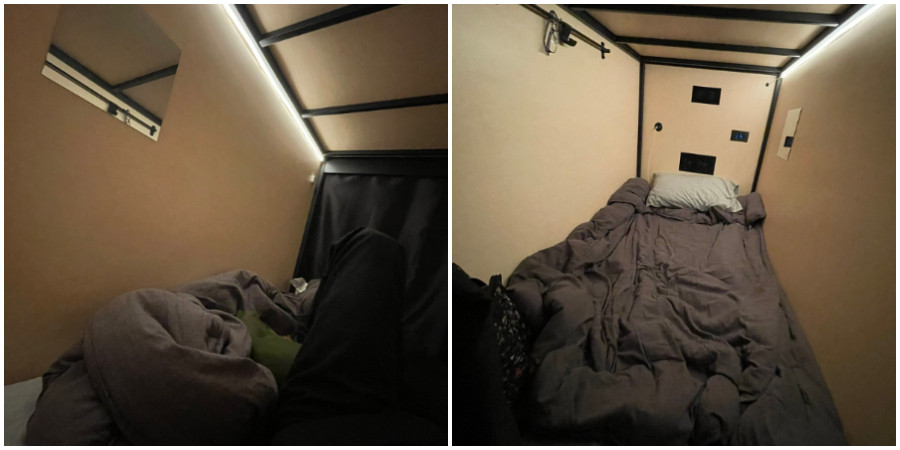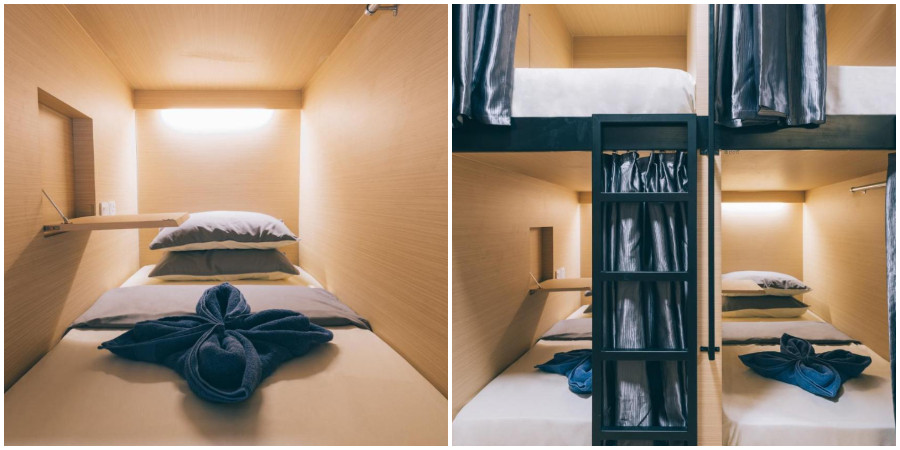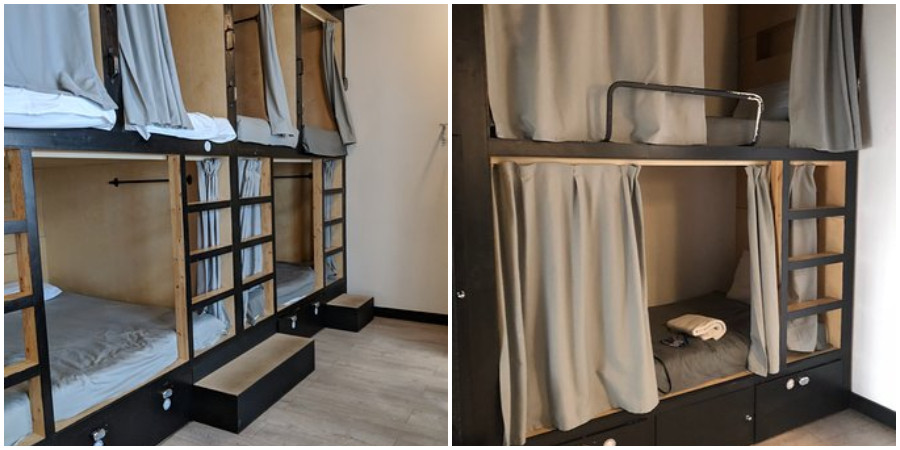Bed Pods for Techs: Embracing the Silicon Valley Grind

©️ Dicklyon / Wikipedia / Lewis / X(Twitter)
In the fast-paced world of tech entrepreneurship, the journey from startup grind to multimillion-dollar success can be a rollercoaster. Christian Lewis, is a 26-year-old entrepreneur hailing from the Chicago suburbs. He recently shared a glimpse into the grittier side of pursuing the AI dream in San Francisco – a city renowned as the AI capital of the world. The story gained media coverage not only for the Lewises story but also for the growing culture of living in pods and their legal status under the city’s building codes.
High Cost of Living in San Francisco
Lewis is the founder of the artificial intelligence programming startup Spellcraft. He made waves when he posted on social media that he was “living in a $700/mo pod at Mint Plaza for the next 30 days.” These pods offer a unique and cost-effective living solution in the heart of San Francisco. They are reminiscent of the Japanese pod hotels designed for budget-conscious travelers.

Lewis planes to navigate the startup landscape until Spellcraft achieves significant success. He anticipates remaining in the pod for about a year. Reflecting on the financial realities of traditional San Francisco apartments, he acknowledged that a substantial leap in his startup’s fortunes would be necessary to afford a more conventional living arrangement.
Bed Pods for Techs
In a candid exploration of his living quarters for ABC7, Lewis described the 4 feet-high, 3½ feet wide pods, each equipped with a twin-size mattress. While some might find the idea reminiscent of Hong Kong-style “coffin homes,” Lewis insisted it’s a form of “minimalist living”. According to him, the pods are tailored for young, unattached individuals seeking a temporary haven in the bustling city.
Contrary to initial perceptions, Lewis shared that the pod experience was surprisingly comfortable. The top floor of the three-story building, once a bank, now houses around 20 pods. These compact living spaces serve as a melting pot for diverse occupants. Especially for founders, programmers, post-graduate students, artists, and individuals working in retail and service industries.
Brownstone Shared Housing, the company behind the development, gained international attention for a similar project in Palo Alto. The pods, though previously dubbed by some as a “pricey prison,” have proven to be a viable option for those drawn to San Francisco’s tech boom. Lewis expressed satisfaction with the communal living spaces. He underlined the coziness of the common areas adorned with string lights and faux-brick walls.
The pod housing, repurposed from its former life as a San Francisco Fire Credit Union outpost, retains traces of its past. Bank tellers’ desks now serve as shared workspaces, offering a unique blend of history and innovation. However, not everyone welcomed media attention to their communal spaces, hinting at the delicate balance between privacy and publicity.
Lewis’s Reason Behind His Choice
The decision to opt for a pod over a traditional rental was strategic. With the average rent for a one-bedroom apartment soaring to $3,040 a month, the $700 pod provided Lewis with a budget-friendly alternative. This allows him to navigate the city’s expensive real estate market without committing to a lengthy lease. Also, it aligns with his preference for minimalist living.

The move was driven by Lewis’s determination to be closer to the epicenter of AI innovation. San Francisco, home to tech giants like Anthropic, ScaleAI, and OpenAI (the maker of ChatGPT), beckoned him with its promise of unparalleled opportunities. He emphasized the numerous advantages of living such a life for ABC7, revealing his commitment to staying until his funds run out.
In the meantime, Lewis embraces the camaraderie of like-minded individuals pursuing their dreams in the city’s tech hub. His story sheds light on the unconventional paths some tech founders take in their quest for success. It also highlights the determination, resilience, and resourcefulness required to thrive in the competitive world of Silicon Valley.
San Francisco Housing Crisis
In the challenging landscape of the Bay Area’s housing market, compromises often define the search for affordable living spaces. Tech enthusiasts in downtown San Francisco are renting small bed “pods” for $700 a month. It can be defined as a single twin mattress and measures a mere 4 feet in height.
Reports from SFGATE shed light on this unconventional housing solution provided by the startup Brownstone Shared Housing. Constructed from steel and wood, these pods, arranged in a two-high, 14-long grid, feature a blackout curtain at one end. While residents share communal bathrooms and some common spaces, the setup lacks a full kitchen and laundry facilities.
Brownstone CEO James Stallworth revealed that the company’s foray into pod living began in June in San Francisco’s SoMa neighborhood. The startup also operates pod rentals in Palo Alto ($800 a month), San Jose ($650), and Bakersfield ($500). Despite the steep price of living in a 4-foot-tall rectangular prism, Stallworth stated that all 28 beds in the SoMa location were booked for October. This reflects the intense demand driven by the exorbitant housing costs in the Bay Area.

Interestingly, the trend of AI enthusiasts opting for pod living is emerging. While Brownstone doesn’t selectively choose residents based on their professions, AI-focused individuals seem drawn to the concept. Stallworth mentioned, “It turns out AI is currently what a lot of people are doing.”
Looking ahead, Stallworth envisions a broader application of Brownstone’s pod design and model as a solution to homelessness. The startup is working on refining the SoMa location and considering a rebrand to distance itself from the potentially negative connotations associated with the term “pods” in science fiction. Stallworth suggests “private beds” as a more apt descriptor for their unique housing solution.
Investigation for Building Codes Violation
Brownstone Shared Housing now finds itself under the scrutiny of San Francisco building authorities. A recent surge in social media and local news reports prompted the Department of Building Inspection to launch an investigation into the startup’s San Francisco location, with concerns raised about potential code violations. This article delves into the details of the investigation, the startup’s business model, and its previous encounters with municipal authorities.
Patrick Hannan, a spokesperson for the San Francisco Department of Building Inspection, confirmed the initiation of an investigation into Brownstone Shared Housing, reports SFGATE. The department aims to determine whether the startup’s sleeping pods violate building codes. Hannan stated that they would conduct a site visit soon to assess the situation on the ground. The investigation follows a series of reports that gained viral attention on social media platforms and was first reported by the San Francisco Standard.

Despite the attention garnered by its innovative approach to housing, Brownstone Shared Housing has remained tight-lipped, with no immediate response to Forbes’ request for comment on the ongoing investigation. Furthermore, Pitchbook reports that the startup received an undisclosed amount of funding from Scale VC, now known as Redbud VC, late last year. Redbud VC, however, has not responded to Forbes’ request for comment. In a June tweet, Brownstone Shared Housing announced the opening of its San Francisco location, claiming it to be its “biggest yet.”
You might also want to read: People in Toronto Are Renting Out ‘Half Their Bed’


